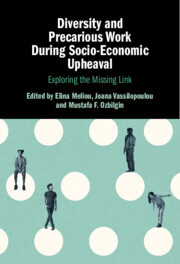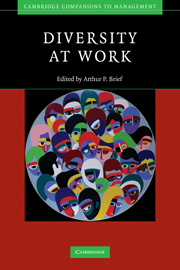Diversity and Precarious Work During Socio-Economic Upheaval
Existing research on the rise of precarious forms of employment has paid little attention to gender and diversity challenges. Yet precarious work has damaging effects for vulnerable demographics, with women, ethnic minorities and people with disabilities more considerably affected. This volume unpacks this research and offers insights into the role of organizations in fostering inclusive change. It draws an awareness of precarious work and diversity in organizations in three ways: 1. Uncovers and documents the variety of issues facing vulnerable demographic groups at work. 2. Promotes greater scholarship on the link between precarious work and diversity during economic and social upheaval. 3. Develops a research program and agenda that sheds light into new and important aspects of precarious work and diversity issues. A group of international scholars come together to discuss ways to address these challenges and offer a way forward for the future.
- Introduces key concepts and novel literature to consider the link between diversity and precarious work
- Features a broad coverage of diversity categories, including transgender and precarious work, and refugees and precarious work
- Use real case studies to provide examples of intersectional research
Reviews & endorsements
'A structural shift in the economy saw the rise of precarious employment, which has been heightened by several disruptions, including the financial crisis, the COVID-19 pandemic, and widespread adoption of artificial intelligence in workplaces. This important collection of works highlights these disruptions and advances our understanding of how they affect individuals with marginalised identities and society's most vulnerable.' Eddy Ng, Smith Professor of Equity and Inclusion in Business, Queen's University, Canada, and Editor-in-Chief of Equality, Diversity and Inclusion: An International Journal
Product details
No date availablePaperback
9781108932837
329 pages
229 × 152 mm
Table of Contents
- 1. Introduction Elina Meliou, Joana Vassilopoulou and Mustafa F. Ozbilgin
- 2. Pandemic precarities and gendered biopolitics within the neo-liberal university Steve Vincent, Ana Lopes, Nosheen Jawaid Khan, Andrew Kozhevnikov and Julie Monroe
- 3. LGBTQ+ individuals and precarious work Oscar Holmes IV, Erhan Aydin, Richard Greggory Johnson III and Emir Ozeren
- 4. Age, gender and precarity: the experience of late career self-employment Elina Meliou and Oliver Mallett
- 5. How the (in)ability of using one's disability strategically reinforces inequality and precariousness amongst disabled workers: the case of France Sarah Richard and Sophie Hennekam
- 6. Classed and gendered experiences of precarity in dirty work Rachel Morgan, Annilee Game and Natalia Slutskaya
- 7. Precarity and diversity: the intersectional case of female Christian janitorial workers Mariam Mohsin and Jawad Syed
- 8. Precarious work in the gig economy: diversity, race and indigeneity lenses Kurt April
- 9. Refugees' vulnerability towards precarious work: an intersectionality perspective Lena Knappert, Brigitte Kroon, Angela Kornau and Bassant Abdelmageed
- 10. Trapped in precarious work: the case of Syrian refugee workers in Turkey Deniz Palalar Alkan, Rifat Kamasak, Esin Sayin and Joana Vassilopoulou
- 11. How precarity is threaded into migration rules: the case of the UK, Germany and Australia Dimitria Groutsis, Shireen Kanji and Joana Vassilopoulou
- 12. Culture, precarity and dignity Ramaswami Mahalingam
- 13. Transforming humanitarianism: precarities at work in the new activist volunteer sector Sue Clayton
- 14. Artificial intelligence, gig economy and precarity Mustafa F. Özbilgin, Nur Gundogdu and Jan Akalin.






